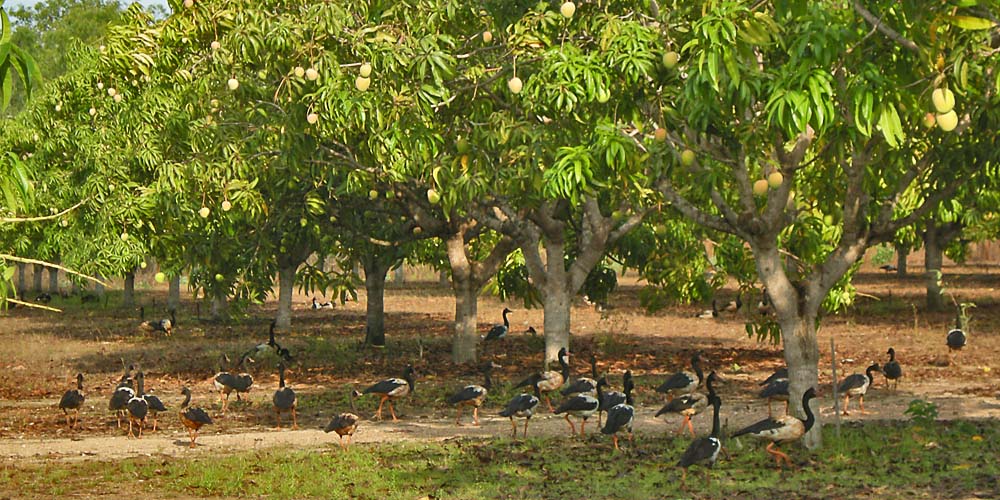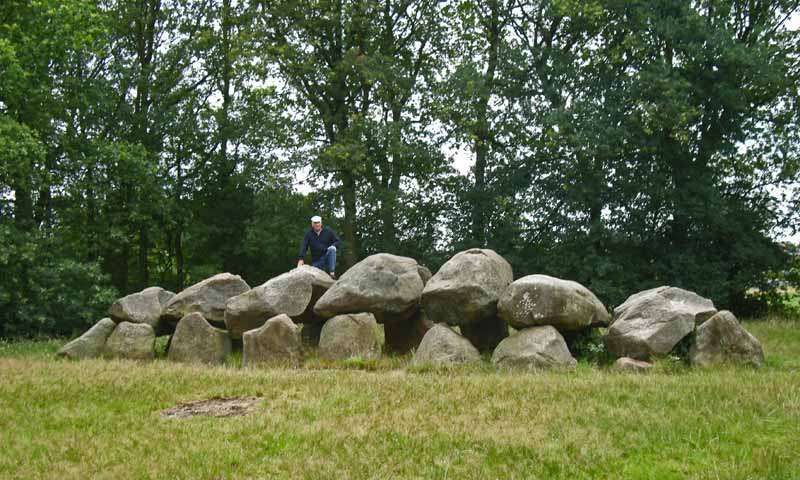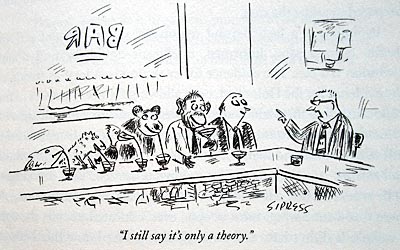30. About Entropy
---------------------------------------------------------------
Previous - Next - Contents
Entropy (I quote from Brian Greene's book "The Fabric
of the Cosmos")
is a measure of disorder in a physical system. High entropy means that
many rearrangements of the ingredients making up a system would go unnoticed, and this
in turn means the system is highly disordered.
Low entropy means that
very few rearrangements would go unnoticed, and this in turn means the system is highly
ordered."
 On this photograph for example,
the mango trees are neatly aligned in a straight line and spaced at equal
intervals. It represents a system of low entropy, because if one tree was
removed and placed say halfway between this row and the next, it would immediately catch
our attention.
On this photograph for example,
the mango trees are neatly aligned in a straight line and spaced at equal
intervals. It represents a system of low entropy, because if one tree was
removed and placed say halfway between this row and the next, it would immediately catch
our attention.
The geese underneath the trees, on the other hand, represent a system of high
entropy. Taking one of them away and placing it somewhere else, would largely go
unnoticed.
If there were only two or three geese present underneath the trees, taking one away or
shifting it to another spot would of course draw immediate attention. So the more
ingredients (geese) a system has, the greater potential it has for high entropy.
In physical systems with many constituents (I quote Greene again), there is a natural
evolution towards greater disorder, since disorder can be achieved in so
many more ways that order. In other words, physical systems tend to evolve toward states
of higher entropy.
 Here I leave Greene and follow my own (non physical, layman's) thoughts on this
interesting topic, making no apologies if I apply it perhaps somewhat broader than
science would have intended.
Here I leave Greene and follow my own (non physical, layman's) thoughts on this
interesting topic, making no apologies if I apply it perhaps somewhat broader than
science would have intended.
Curiously, where nature tends to evolve towards greater entropy, we humans try to
do the opposite, creating low entropy order whenever we can, because order,
"straight thinking", logic, is very much our thing.
Scientists look at a high
entropy situation and trace it back to its initial low entropy state and to the rules
by which it is governed. And we have done a marvelous job. Look at the abundance of life
forms all around us today, and we can trace it now back to its very beginning : the
simple joining of two primitive cells.
We walk through a natural forest and there is high entropy all around us. Trees grow
where seeds have fallen, blown at random by the wind, or carried within birds until
discarded in their droppings. Enter a pine forest plantation or fruit farm and there is
nothing but straight lined trees, low entropy, because it makes sense for maintenance and
harvesting.
The legendary Jazz singer Tony Bennett once
said in a TV interview : "There are no straight lines in nature."
 And I believe he is right. Think of a line as being a series of perfectly aligned
interconnected dots, a system of very low entropy. Would not last very long in nature!
And I believe he is right. Think of a line as being a series of perfectly aligned
interconnected dots, a system of very low entropy. Would not last very long in nature!
Wherever man goes he leaves a low entropy foot print, the Dutch hunnebedden in the Northern province
of Drenthe are a perfect example. A bunch of large granite boulders strewn around naturally at random
would draw no attention whatever, but used to construct a grave and bingo a human low
entropy foot print is left behind for thousands of years.
When walking through the bush in outback Western Australia as a geologist during
the Nickel boom (1968) I would marvel at the untouched wildness of the place. Then
suddenly amongst the rubble strewn around everywhere around me I notice a few flat
stones, three perhaps, not larger than a sheet of paper, placed on top of one another. A
marker for a mineral claim boundary, a survey point ? A low entropy human foot print, in
the middle of a millions of years old high entropy expanse.
 From childhood onwards we are taught : order, by our parents, at school, at work,
in the army. When finished eating (as a child) and leaving the table you place your
chair back properly where it belongs, to restore low entropy. It is still with me,
strongly, I judge people by it !
From childhood onwards we are taught : order, by our parents, at school, at work,
in the army. When finished eating (as a child) and leaving the table you place your
chair back properly where it belongs, to restore low entropy. It is still with me,
strongly, I judge people by it !
In the Mooloolaba Surf
Club the staff do a great job, neatly arranging tables and the chairs around them.
Empty plates and glasses are removed immediately. A very aggreeable low entropy environment. Some people
enter the Club, sit down have their meal, carelessly shove their chairs back and walk out. Low
entropy destroyed. I am annoyed and judge : no education, blunt, careless, oblivious to the comfort of others,
little awareness.
I believe that composition (the pleasing arrangements of objects) too is an
expression of human's intuitive sense for low entropy. Some of course possess this sense more than
others.
My father would marvel at my mother. Every time she entered the lounge room,
she would, intuitively, almost unconsciously, move an ornament on a table here, rotate a
vase with flowers slightly there, as she walked past it. "It is all perfect again", my
father would sigh.
 My sister Wivica was in her earlier years an specialist
interior decorator consultant for fashionable jewelry shops throughout Europe.
My sister Wivica was in her earlier years an specialist
interior decorator consultant for fashionable jewelry shops throughout Europe.
When she
applied for the job she was given by her interviewer an object which she was asked to
place on a large rectangular table. After Wivica had done that, the interviewer took out
a tape measure, and measured the exact position of the object with respect to the sides of
the table. "Perfect" he said, "the Golden
Cut, spot on!
What does this mean? For human perception even a single object seen
within a spacial context (a table, a landscape, etc.) there are only a few low entropy
("just right") positions. In contrast there are lots of "wrong" positions, high entropy,
because it does not matter where the object is placed then.
Entropy and Evolution
It is important to recognise that although entropy guides the overall general trend of the development of the universe, it is however subjected to other forces and conditions.
For example Gravity (which pervades the entire universe) tends to cluster particles together into stars and planets. So there can be order even in a high entropy environment.
Brian Greene writes :
"..... even though the clumps appear to be more ordered than the initial diffuse gas, in calculating entropy you need to tally up the contributions from all sources."
"...... the entropy decrease through the formation of orderly clumps is more than compensated by the heat generated as the gas compresses, and, ultimately, by the enormous amount of heat and light released when nuclear processes begin to take place. This is an important point that is sometimes overlooked."
|
This means that just taking entropy as the sole driving force in various philosophical postulations is (at least in my view) over simplistic and not valid.
Disorder and complexity are not synonymous, they are two entirely different things.
 Life on earth is very varied and complex, but its evolution has followed a clear directional path constrained by the environment and prevailing conditions. Only those species that adapt and take most advantage of the environment survive. There is complexity but no disorder. The disordering entropy trend is constrained by the prevailing conditions.
Life on earth is very varied and complex, but its evolution has followed a clear directional path constrained by the environment and prevailing conditions. Only those species that adapt and take most advantage of the environment survive. There is complexity but no disorder. The disordering entropy trend is constrained by the prevailing conditions.
Also, for example, the human skeleton is a very complex thing but it follows the exact same design as all other mammals on earth. This points to a clear preferred layout (evolved over time through hit and miss attempts) for a useful and successful skeleton arrangement (See Richard Dawkins : The Greatest show on Earth). Once again complexity, but no disorder.
I never think in terms of entropy when considering the evolution of the universe.
I rather see it as the evolution of the crudest form of blunt energy (the Big Bang) towards ever more sophisticated, eventually living, and through the human species, aware and comprehending energy. There is complexity in this process, but no disorder.
This process (if you like) is driven by a general trend towards higher entropy, but channeled through other forces and local environments towards ever more complex (but in a sense logical and "ordered"), sustainable outcomes.
Next Page -
Top of Page
Copyright © 2010 Michael Furstner
|





